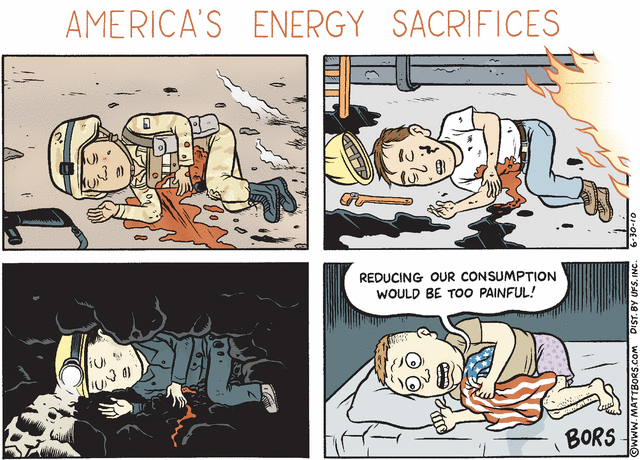by Joan McCarterThe question that's been bouncing around among pundits is why, in the midst of the greatest environmental disaster the nation has seen, there is no impetus behind creating a strong, effective energy and climate change bill. Jon Cohn postulated that it's largely a failure of liberals and environmentalists to put on enough pressure. Josh Nelson responded, smartly and convincingly, that it's the Senate that's the problem.
Grist's David Roberts follows up on that point in a post he wrote last week to expand on what he didn't have a chance to say when he was on the Rachel Maddow show.
[M]uch of the controversy around the bill has to do with the power sector -- that is, changing the way we make and use electricity, which is a separate issue [from oil]. The bulk of the reductions in greenhouse gas emissions will come from the power sector. What carbon price may survive in the bill, in the form of a utility-only cap-and-trade system, will apply only to the power sector.
Oil politics and electricity politics are distinct beasts with distinct coalitions and dynamics. They're being crammed together in this bill, which is serving to obscure some of those differences. The oil-related measures in the bill are reasonably popular on a bipartisan basis (mainly because they don't include a gas tax). An oil-focused bill could probably get to 60 votes. But an oil-focused bill wouldn't be a climate bill. The struggle over the power sector adds a huge layer of difficulty, since many regions of the country benefit from artificially suppressed electricity rates and punish any politician who threatens to raise them. That can't last, of course, but it's enough to fubar the politics of this bill....
Yet action on climate is being blocked by the lockstep nihilism of the Republican minority and the unprincipled cowardice of "centrist" Democrats. It so happens that in the Senate, rural and fossil fuel-dependent areas are overrepresented and there is an absurd, undemocratic 60-vote supermajority requirement for all legislation. These accidents of history present barriers to action that are all but insuperable, even by leaders with more ambition and less fear, even in a time of less economic anxiety. In this case, the Senate's dysfunction may have devastating consequences for our children and grandchildren. It's outrageous.
Yes, the American public is discouraged, disillusioned, and more worried about the economy. But blaming this one on the public, when you've got the Senate that we've got is unfair. And given the Senate that we've got, with nihilistic Republicans hell-bent on destroying government and enough ConservaDems to enable them, it'd take the entire Capitol being awash in the Deepwater Horizon goo for that body to act responsibly.
Where does that leave lawmakers? Obama wants a price on carbon, which seems out of reach. It's not included in the preview the Washington Independent's Andrew Restuccia got from a Senate source.
The legislation, which is still being cobbled together from a number of pending proposals, will, according to the source:
- “help expedite cleanup of and recovery from the oil in the Gulf of Mexico, ensure that the polluters are held liable for damages caused, and put better systems in place to regulate deepwater drilling.
- “create jobs and save consumers money through residential and commercial renovation incentives and by setting higher energy efficiency standards for new homes, products and appliances.
- “set a national renewable electricity standard and provide new financing options for clean energy investments, including low-carbon power generation.
- “improve the nation’s electricity grid and make it more likely that remotely generated renewable power will get to market.
- “decrease oil consumption by several million barrels per day and help electrify the transportation sector, as well as convert heavy duty fleets to cleaner fuels like natural gas
- “eliminate major oil and gas subsidies and expand and extend incentives for consumers and businesses that want to invest in energy efficient buildings, clean power, alternative fuel vehicles, and domestically produced biofuels”
The source says “a large portion” of the bill will be pulled from the legislation authored by Sen. Jeff Bingaman (D-N.M.), which was approved by the Senate Energy & Natural Resources Committee last summer.
One noticeable absence from the list: a cap on carbon emissions.
In a follow-up post, however, Restuccia notes that environmental groups are pushing for what they think they can get--a utility-only cap.
The last-minute push by environmentalists could be the last chance to show support for any sort of cap on carbon emissions in an energy bill. A senior Senate source told TWI earlier today that a final energy bill is expected to include an oil spill response package and a renewable electricity standard, but not a cap on carbon, even a utility-only cap.
The source and an additional environmentalist source, both of whom asked for anonymity to discuss the sensitive issues surrounding the debate, said Sen. Olympia Snowe (R-Maine) and her staff are working with Sen. John Kerry (D-Mass.) and his staff on a compromise energy bill, though the details remain unclear. A spokesperson for Kerry would not comment and a spokesperson for Snowe did not immediately return a request for comment.
Any quick action is unlikely, with Byrd's seat still empty (and don't expect a West Virginia, even a temporary one, to be supportive of any kind of cap), and having to rely on Olympia Snowe for that key Republican vote.
continued at Daily Kos....
 This is my first EcoJustice diary and an overwhelming thought because one of the very real impacts of environmental issues has to do with the painfully unfair way hey affect less developed nations and the poor in more developed nations.
This is my first EcoJustice diary and an overwhelming thought because one of the very real impacts of environmental issues has to do with the painfully unfair way hey affect less developed nations and the poor in more developed nations.


